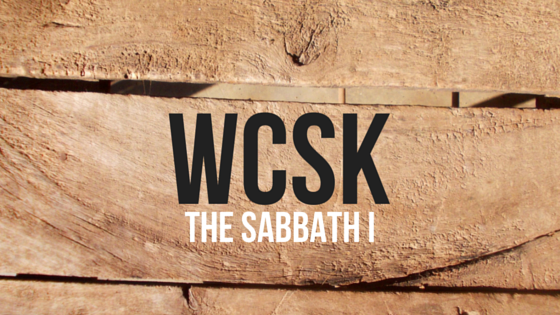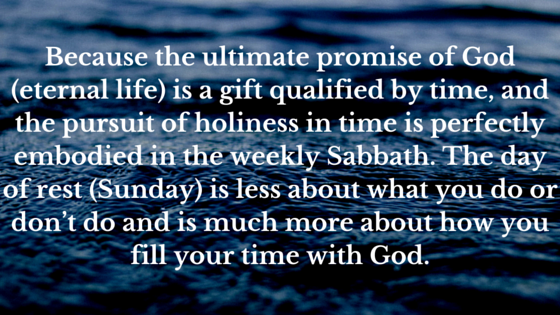How this Biblical principle applies to your everyday life:
Introduction
If I were to piggyback and use the lesson on sanctification to sum up this lesson in two sentences, here it is: Sanctification refers to the pursuit of holiness in space. The Sabbath refers to the pursuit of holiness in time.
Of course, one reason why Christians pursue holiness in time is because we pursue eternal life, not temporary life in the world. The temporary world will pass away, so we strive for The Lord and His Word, which are endless. God rested on the Sabbath, and the Bible commands us to do the same:
“Remember the sabbath day, to keep it holy. Six days you shall labor and do all your work, but the seventh day is a sabbath of the Lord your God; in it you shall not do any work, you or your son or your daughter, your male or your female servant or your cattle or your sojourner who stays with you. For in six days the Lord made the heavens and the earth, the sea and all that is in them, and rested on the seventh day; therefore the Lord blessed the sabbath day and made it holy” (Exodus 20:8-11).
“So there remains a Sabbath rest for the people of God” (Hebrews 4:9).
“Sanctify My sabbaths; and they shall be a sign between Me and you, that you may know that I am the Lord your God” (Ezekiel 20:20).
“If because of the sabbath, you turn your foot from doing your own pleasure on My holy day, and call the sabbath a delight, the holy day of the Lord honorable, and honor it, desisting from your own ways, from seeking your own pleasure and speaking your own word, then you will take delight in the Lord, and I will make you ride on the heights of the earth; and I will feed you with the heritage of Jacob your father, for the mouth of the Lord has spoken” (Isaiah 58:13-14).
Practically speaking, many Christians may be aware that the Sabbath (or Sunday) is a “day of rest.” It’s a day different from the others because you get up later than normal, you typically don’t go to work, you do go to church, and the very essence of the day feels different from the rest of the week. This distinctive essence is a signal that the Sabbath is in fact intrinsically separate from the other days, and what Christians should know is that God has decreed not only that the Sabbath be distinct, but that the way we think, act, and behave on the Sabbath be distinct.
From this distinction and subsequent separation results an evergreen way of thinking about God, ourselves, our neighbors, and the world. We therein carry this imagination with us into all those other “regular” days. In this frame of mind, we don’t do our regular routine Monday through Saturday and then take a break on Sunday. Rather, Sunday is when we embrace our true selves. Here, God has provided the time (by stopping labor) so that we may devote all of our hearts, all of our souls, and all of our might to The Lord within the confines of a sacred, hallowed day. There are many other things that will compete for our time the rest of the week, but Sunday belongs to God. Exclusively focusing this day on the One who gave us days in the first place is an often overlooked and casually dismissed act of worship, reverence, and obedience to The Lord.
In this lesson, I am strategically going to avoid speaking about the Sabbath as it pertains to the Fourth Commandment because there will be an entire lesson devoted to this in What Christians Should Know Volume III: The Ten Commandments. Accordingly, this lesson will assist you in the process of formation and how you think about the Sabbath. The lesson in Volume III will be focused on execution and the specific peculiarities of the Fourth Commandment. By far, of all the chapters in this book, this one will persuade you to think more than you actually do.
Furthermore, many of the concepts discussed will rely on a timeless classic, The Sabbath by Abraham Joshua Heschel. This is a text that I highly recommend and encourage everyone to read for themselves: Your walk with God and understanding of the Sabbath will forever be changed.
What is the Sabbath?[1]
The Sabbath is Sunday and is a day of rest and holiness. The word for Sabbath comes from the Hebrew word sabat, which means seventh. Hence, the Sabbath is the seventh day and is the first thing in the history of creation that was made holy by God.
Genesis 2:2-4 (ESV) says:
“And on the seventh day God finished his work that he had done, and he rested on the seventh day from all his work that he had done. So God blessed the seventh day and made it holy, because on it God rested from all his work that he had done in creation.”
Holy comes from the Hebrew word qadas, which means to be clean, consecrate, be hallowed, or be separate. So by hallowing the seventh day, God set the Sabbath apart from the rest. Why is this important? Because, as an ordinance for all of creation, God declared that the seventh day would be something unique and special. God is in a covenant with creation, and a critical component of that covenant is the Sabbath—it so critical that in the Old Testament, violation of the Sabbath carried with it the penalty of death. Because of the meaning of the word Sabbath, some insist that Saturday is the legitimate Sabbath and not Sunday. Yet, historically speaking, Christianity has celebrated Sunday as the Sabbath because it is the day that Christ rose from the dead,[2] and it is called the “Lord’s day.”[3] It must be noted that prior to the resurrection of Christ, the Sabbath was celebrated on Saturday, and then it moved to Sunday, the first day of the week, after the resurrection.
Potentially, I could divert here and discuss some of the quarrels believers have about the Sabbath, but my concern is not about the specifics of the day but rather the principle of the Sabbath. Bible scholars and theologians have many disagreements about what is proper to do and not to do on the Sabbath, yet a vast majority concur that it is certainly a time to…
Dr. C. H. E. Sadaphal
[1] See Genesis 2:1-3; Exodus 20:8-11; Isaiah 58:13-14; Matthew 12:1-14; Acts 20:7; I Corinthians 16:1-2; Revelation 1:10
[2] Mark 16:9
[3] See Revelation 1:10
[4] R. C. Sproul, Essential Truths of the Christian Faith (Wheaton, IL: Tyndale House Publishers, 1992), 239.
[5] This is an intriguing point of contemplation because according to God, there is something much more desirable than “good,” and that is holiness. We stand on earth able to be simply “good” by our own merit. God stands in heaven, being holy, something remarkably distinct and greater than “good.”
[6] Abraham Joshua Heschel, The Sabbath (New York: Farrar, Strauss and Giroux, 2005), 9.
[7] See Exodus 25-40.
[8] Heschel, The Sabbath, 10.
[9] Heschel, The Sabbath, 3.
[10] See Mark 8:36, 16:26
[11] Heschel, The Sabbath, 16.
[12] Heschel, Sabbath, 89.


